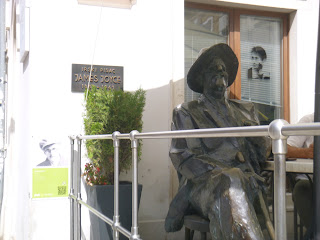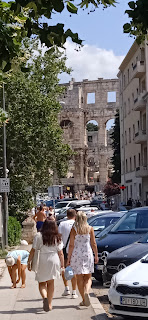Caroline’s favorite waters are in Croatia, warm and blue. We swam them two years ago. Needing to see them again before we leave, she made plans for us to hit the water, just outside of Pula Kroatia. We’d spend the next four days there, playing hookie. I knew nothing of the place, except that it was once a part of Yugoslavia, the distinct, non-aligned socialist federation of six republics: Croatia,Montenegro, Serbia, Slovenia, Bosnia and Herzegovina, and Macedonia that went through several forms before and after the world wars, lasting until the early 1990’s civil wars, that ended in the early 2000’s. "The first mention of the name Pula, in its plural as ‘Polai’” says one of the travel blogs, “occurred in 3rd century b.c., in the work of Greek poets Callimachus and Lycophron in the mythological story of Jason and Medea. Jason, of course, stole the golden fleece, and with the help of Medea run away. Colchis were chasing them, but could not catch Jason, a very skilled sea traveler. They didn't dare to return without the golden fleece, so they settled in the upper Adriatic, where the Illiric tribe lived, and named the city - The City of Refuges, in their language - Polai. Centuries later greek pottery was found, as well as parts of a statue representing Apollo, and some other traces of Greek culture. The beginning of Roman domination (177 b.c.) in the Istrian peninsula, was the beginning of ethnic changes and romanization. Around 46-45 b.c. Pula got the rank of a Roman colony…The names of founders are engraved in the oldest standing Roman monument in Pula, the Hercules Gate, which also shows the bearded head of this mythical hero who the Romans, along with other deities and heroes, adopted from Greek mythology."
Arriving, we encounter the heat and the usual confusion, where to go to get the bus from the airport, to the bus station, one k to the hotel by foot. And then off to the closest beach for swimming. It's all worth it, a gorgeous ocean, lovely food and sleep. Our apartment is ancient, with well worm markings where people have stepped up the stairs for years. The next morning, we wake to a quiet city, a quiet morning here. Thinking about our year of travel, investigating civil wars, writers, immigrants and routes between empires, sitting just outside the Hercules Gate, drinking a coffee. The city was largely spared during the 1990’s civil war, spare a few explosives in November of 1991, during the war for independence, in what became known as the Pula Airport Incident of November 10, 1991. I was in Italy then. I remember the country turning trains of people fleeing the Civil War, beginning to rage. They’ve seen a lot of conflict. The first mention I can find of civil war here was in 42 BC when war broke out between the triumvirate of Octavian, Anthony, and Lepedis, vying for power against Brutus and Cassius, Ceasar’s assassins.
We talk with our waiter about it all. “Its the Balkins. We have wars here every fifty years or so,” he replies, with a shrug of the shoulders. “People hate the Serbs because someone tortured someone. The Serbs hate us. Its what we are taught when we are kids. You ask when the person was tortured. They can’t tell you. But it was before they were born. The kids don’t just hate. They could play with anyone. Its something they learn.” The conversations go on all week.
Across from us is a statue of a man, who looks like Joyce. Is that Joyce, I wonder, getting up to go take a look. And sure enough it is. Tourist info explains:
"An unusual life story of the man and artist in his “escape from history”, a concatenation of destiny events, when looking for a job after leaving Trieste Joyce arrived in Pulaon October 1904 and stayed till March 1905. In Pula, the Austro-Hungarian imperial royal naval base, James Joyce worked as a professor of English at the Berlitz School, teaching mainly the Austro-Hungarian officers in the town with Naval Shipyard. Already in Pula James Joyce was imbuded with the “Ulysses picture” of the modern man’s split personality.
JAMES JOYCE – with full name James Augustine Aloysius Joyce, Irish poet, short story writer and novelist, is one of the greatest writers of the 20th century and pioneer of free written expression. Joyce is certainly most famous for his innovative modern prose style, particulary the narrative technique known as the stream of consciousness. He was born in Dublin (Ireland) in 1882, and died in Zuerich (Switzerland) in 1941. His most renowned works are the short stories “Dubliners”, the novels “A Portrait of the Artist as a Young Man”, “Ulysses”, and “Finnegans Wake”, and the collection of poetry “Chamber Music”. The memory of James Joyce in Pula is breathed near the old Roman Arch of the Sergi at the Portarata Square in the coffe bar “Uliks” (Ulysses), just a few steps from the memorial tablet placed on the building where James Joyce taught the English language. Today, the bronze James Joyce is sitting by the table at the small terrace of Uliks coffee bar, waiting for the ordered espresso or a glass of Istrian Terran, having a break after strolling Pula at the start of a new century… James Joyce has been sculptured in bronze by Mate Čvrljak, the sculptorfrom Labin and a representative of the contemporary Croatian sculptural arts.”
After breakfast, we walk, looking for the bus to the beach. An elder man helps us find it. We chat as we sit.
“Croatia is a slave to Europe. It was better fifty years ago,” he tells us. “Now we are a slave to the eurozone. We are a beautiful country. All Europe can come.”
From Rome to France, Austria to the Austro Hungarian Empire, Yugoslavia to the European Community, the tides have been many. The conversations about the space keep on in my mind. “Was just part of our history,” says the waiter philosophically. “The fights we have every fifty years or so here.” Stories flow from these streets, with the history and the lovely wine.
At the beach, waves crack on the share, sounds of Italian kids playing in the bluest waters, sunbathers, and swimmers. Civil wars meander through my mind, trying to pull together the pieces. I keep thinking of the partisans who helped the republicans fight fascists in Spain. “It was better under Tito,” said the man at the bus stop. “Now we're slaves to the EU.” The sound of sicadas fill the air, especially when its hot. No cats on the beach here, notes Caroline. Something happened to them. Seagulls fly about, joining us on the beach. Secedas tell you when it's hot, the water warm, she says.
We swim till six, stopping for pommes and beer, and then for a fantastic meal at a wonderful little spot. On the sidewalk, along a busy corridor of old buildings, a little shabby, people walking to and from, we enjoy some scampi and sardines. Our amiable waiter brings us an ample supply of Croatian wine, which we enjoy looking at the old city, taking it all in, hearing stories. After dinner, we walk to the ancient amphitheater where we watch Croatian movies late into the night.
Day Three
We’re off early for another adventure, an excursion at sea, strolling to catch our morning boat. We encounter a statue of Tito. Tito's shadow still looms large here. Yet why couldn't the federation of Southern Slaves endure? That question still lingers. Many remember him fondly, appreciating the socialism American style as one man put it, referring to open space for travel, free beach vacations as well as job security.
A man we met who self-identified as a gypsy said his family was persecuted by the Communists. It's better now. But the stigma was real. His mom worked for Tito and didn’t fare too well. Many recall the civil war years of the mid-1990s here, happy to talk about them. The younger folks missed it.
We catch a ferry out for a trip to Jerolim Island. Waves of seagulls fly with us, joining Caroline, my travelling companion for decades, and I. We swim and chill, walking through the woods, along the water, lazing about, all afternoon long.
Our forth day is less serene. We rent bikes for an adventure on the Premantura peninsula, south of Pula. “Just stay to the right,” the guy renting tells us. “Stay on the bike trail, away from the cars,” he advises. No map, no problem. I stap a photo. He tells us about the beaches we can ride to. No problem. Each name disappears from my mind as soon as he says it. Stay to the right. No problem. Within 100 meters, it zags to the left, up, around, down, through rocks, onto the street, with cars, the trail we were supposed to stay clear of. Gradually, we find our way. Ten k bike ride on rocky biky tails through the woods, round an old peninsula with gorgeous rocky beaches appearing in the distance, blue green warm water, the most lovely beaches, some empty, others full of sunbathers, swimmers, a few wonderful geese, hunting for fish, a grotto, a dog in the water, skinny dippers. Hanging with my travel companion of 23 years, we bike all day, finding secret swimming holes through the years. Striking a pose for freedom after a long swim in the bluest waters, I stretch out on the rocks. And then more biking through the woods, around a gorgeous peninsula, the vacant lotts we rode as kids through Atlanta meander in my mind. Caroline reads a storm is about to hit. And soon enough, black clouds and gusts of wind; storm waters hit, hail, trees fell on a car. Not sure where to ride, we find our way to an old bar on the beach, eluding the rain, with Italians drinking radlers, the sun peaking out into its rainbow. I jump in for a swim and we ride back to town. Caroline and I have endured lots of storms together. Still at it. Still, riding, recalling trips to Hanoi and Sicily, beaches through the years.
Back to our favorite restaurant.
“I’m not sure they are going to have a table for us,” wonders Caroline.
One table left for four.
“This is for them. These are my people,” says our waiter, greeting us, bringing us some Croatian wine at the best table in the place. Looking at another table with sardines and sea bass, our waiter tells us, he will bring us the same. And its magnificent. More wine and chat, on a wonderful last night in Pula, talking about history, places to visit in Ecuador and Columbia, maybe Palermo, looking at this gorgeous ancient city, eating at our favorite restaurant, making new friends with some very gregarious Italian amici, learning the difference between Croatia and Italy, chatting away, riding out the storm, making our way back to Berlin for pride weekend Pula. Till next time ... Hvala vam.












































































































No comments:
Post a Comment